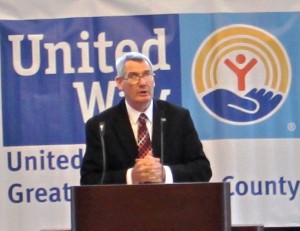DC’s Eight Wonders of Effective Communication
 Ask many leaders to tell you what they really want to work on, in terms of improving their on-the-job performance, and Communication, with a big capital C, invariably shows up on a lot of people’s lists. Sometimes leaders mean that they need to start telling people about things, being more transparent, and sharing with others what is going on in the organization.
Ask many leaders to tell you what they really want to work on, in terms of improving their on-the-job performance, and Communication, with a big capital C, invariably shows up on a lot of people’s lists. Sometimes leaders mean that they need to start telling people about things, being more transparent, and sharing with others what is going on in the organization.
But much of the time, they want to communicate more effectively, in a way that ensures that their message is on target, their words are not lost in the shuffle, and their speech elicits understanding and dialogue. That’s why when Dennis Carman, the President and CEO of the United Way of Greater Plymouth County, recently shared with me what he considers to be his personal “Eight Wonders of the World in Effective Communication,” I wanted to share them with you.
With Dennis’ permission, here’s the list:
- Be prepared: Spend time making outlines, bullet points of ideas, and summary of positions. Consult with others key to any discussion (Board of Directors, Agency Executives, Staff) before the meeting/discussion.
- Listen more: Work to listen 90% of the time and talk only 10% of the time. Use some talking time to reflect back what others have said, affirm others’ good points, and give credit to others.
- Less is more: Consider answering “yes” or “no” if that is all that is being asked. Consider what I want to convey, and then challenge myself to convey the point in as few words as possible. Practice making statements in one clear sentence.
- Be concise: in the written and verbal use of language. Pause and reflect to choose just the “right” (powerful, passionate) words.
- Strike a pose, make a stand: Use “I” statements followed by strong “feeling” statements (I am angry, I am disappointed, I am ecstatic) or clear position statements (I disagree, I fully support, I am in favor of) rather than being vague or leaving others to guess.
- Do not repeat: Say something once and only once without repeating.
- Facilitate, do not monopolize the discussion: Be a helpful time keeper, agenda mover, and champion of hearing from everyone, encouraging discussion and demonstrating my interest in what others have to say.
- Use silence: Pause after statements and pause before going on to the next point. Allow others to consider the merits/deficiencies of my statements.
Thank you, Dennis, for allowing me to share these valuable tips for more effective communication.
For more information on the United Way of Greater Plymouth County or the 92nd campaign, underway now, check out www.uwgpc.org.


